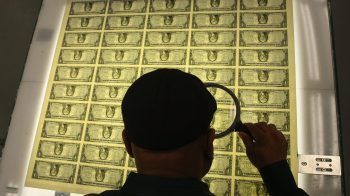Why traders don’t trust word on dollar
TEXT OF STORY
Kai Ryssdal: The official U.S. government line on the official U.S. government currency goes like this. We favor a strong dollar. That’s true no matter who’s in the White House and who’s doing the talking. We favor a strong dollar. On a trip to Asia today, the Secretary of the Treasury recited the relevant quotes. He said a strong dollar is important. Whereupon foreign-exchange traders promptly sent the green back to a 15-month low against the euro. Maybe that’s ’cause currency traders seem to believe the real official policy is that a weaker dollar is OK. For now. Our Washington bureau chief John Dimsdale reports on why the administration seems to be saying one thing and doing another.
JOHN DIMSDALE: A cheap dollar gives U.S. goods and services a price advantage both here and abroad. So why not change the official support for a strong dollar?
DAVID MALPASS: I think they’re worried that if they change the phrase, they don’t know what will happen, so to some extent it’s just inertia.
Encima Global economist David Malpass says the government has been giving only a wink and a nod to a strong dollar policy for nearly 10 years. A flood of dollars into the financial system has devalued the currency and low-interest rates have sent investors elsewhere for better returns. Not the kind of policies that would create a strong dollar.
But Bruce Bartlett, the author of “The New American Economy,” says all finance ministers have to at least say they support a robust currency.
BRUCE BARTLETT: A lot of what sets the value of a currency at least in the short run is psychological and if people think the government wants a weaker currency there is a danger it could fall precipitously.
While a weaker dollar may benefit U.S. exporters, David Malpass says there’s a costly consequence.
MALPASS: When a currency is in a weakening trend, then it makes sense for corporations to borrow money in the local currency and create plant and equipment and jobs abroad because those assets go up in value and the earnings go up.
The result is capital leaves the U.S. And ever since the 1990s, Malpass says, capital flows have been more important to the economy than trade.
In Washington, I’m John Dimsdale for Marketplace.
There’s a lot happening in the world. Through it all, Marketplace is here for you.
You rely on Marketplace to break down the world’s events and tell you how it affects you in a fact-based, approachable way. We rely on your financial support to keep making that possible.
Your donation today powers the independent journalism that you rely on. For just $5/month, you can help sustain Marketplace so we can keep reporting on the things that matter to you.


















